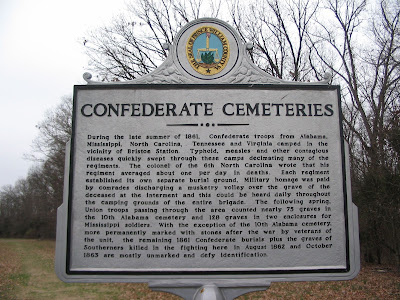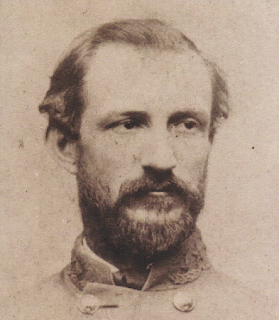On August 3, 1861, Confederate soldiers, belonging to the brigades of Brig. Gens. Henry Whiting and Cadmus Wilcox, arrived from the devastated battlefields of Manassas to the pristine acres surrounding Bristoe Station.
 |
| Historical marker for CAMP JONES |
This encampment was named Camp Jones after Col. Egbert Jones of the 4th Alabama Infantry, who died from wounds suffered at the First Battle of Manassas. These rolling hills served as an ideal location for a large encampment, as it was near the fresh water source of the Broad River and close to the vital Orange and Alexandria Railroad. Camp Jones probably consisted of numerous unit encampments spread out around the Bristoe Station area. Sadly little is known about this camp, it's layout, it's hospitals and it's cemeteries today.
We know that the Sixth North Carolina State Troops marched here on this date, because they told us ...in their muster roster descriptions, like this one from Co.
Co. I, 6th Regiment North Carolina Infantry
Company Muster Roll for June 20 to Aug 31, 1861
“Marched to Camp Jones 8 miles distant 3 August, 1861."
Captain Benjamin F. White recorded his first impressions in his diary on August 3rd:
Saturday, August 3, 1861
Received orders to have tents struck half past five A. M. About seven set out for a new encampment on Broad run near to, and South North of Bristol Station. Encamped in a beautiful place. Water good. Soil in the vicinity pretty good. Night Edward Pace and seven of others pretty sick a number of sick men staying in the officers tents.
Poor sanitary conditions in the camps led to a massive outbreak of various diseases that resulted in nearly 1,000 deaths. Soldiers died from ailments such as yellow fever, dysentery, typhoid, measles and other contagious diseases. Most of these men were buried in various cemeteries organized by their state of origin. There are at least 2 Dozen members of the Sixth North Carolina State Troops that died here. Some were shipped home for burial, but many were buried in Camp Jones in a cemetery whose location is today unknown.
 |
Reverend John Archibald McMannenfrom the Museum of Durham History |
The Rev. John A. McMannen, a frequent visitor to the camp, recorded his observations about the regimental cemetery in a newspaper letter to the The Hillsborough Recorder on Wednesday, October 23, 1861:
"...When I left before, (Camp Jones,) there was not less than six hundred sick men, of this number, twenty died in camp. They are buried side by side, in a lovely spot, on the summit of a lofty hill. The graves are done up with care and neatness, a head and foot-board with the name, regiment, &c, designate who they are.
They are surrounded by a neat enclosure. As I gazed on these twenty graves, memory called up from the past many pleasant reminiscences of by-gone days far back when the war hung below the horizon, and the horrors of the battle-field had not been thought of. By my own fire- side I had warmed some of them, and in their youthful company had spent many happy hours. The words of their lips still rung in my ears, and the pleasant smile still played on their faces.
But, alas I stand now by the grave of McKee, and next lo his is Berry's, and there is Hix's, and yonder young Lawrence sleeps. My heart was filled, but tears came to my relief."
Those mentioned are:
- McKee- Pvt. John K. McKee, Co. B, Age 22 D. 9/24/1861;
- Berry- Pvt Robert Berry, Co. B, Age 17, D. 9/22/1861;
- Hix- Pvt. James Hicks, Co. C, Age 47, D. 9/10/1861;
- Lawrence- Pvt. M. B. Lawrence, Co. I, Age 21, D. 9/30/1861
by Septemnber 18, 1861 The pristine rolling hills had become contaminated with death and disease. The Sixth North Carolina State Troops moved on to Camp Fisher near Dumfries, where they found a clean, pleasant camp ground as well as new military duties guarding the Potomac river.
Camp Jones and Bristoe State had not seen the end of the war and would host both Confederate and Federal encampments as well as several battles before the war was over. These actions would serve to erase the earlier camp, leaving its location somewhat of a mystery today. There is a battlefield park in the general location, but hard boundaries no longer exist
 |
| Colonel Pender |
Colonel Dorsey Pender, the newly appointed Colonel for the Sixth North Carolina State Troops recalled his first impressions on arriving at Camp Jones:
"I find the health of the Reg. terrible. Only about two hundred and thirty fit for duty and many of the sick desperately ill. I fear we shall have a great many deaths before we get through. And accommodations are adverse, worse than on march. I shall do all in my power to relieve these poor fellows… — Col. Willam Dorsey Pender, Camp Jones, Near Manassas, August 27, 1861"




No comments:
Post a Comment